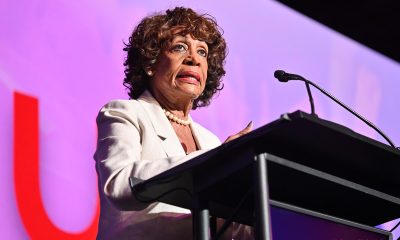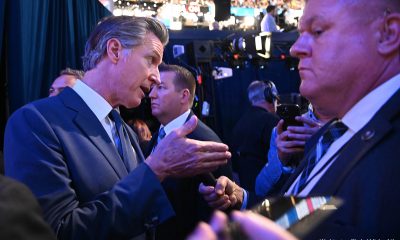California
California legislative wrap-up: Newsom signs multiple bills
In a final flurry of activity this past week and on the final day to take action with legislation on his desk Newsom signs multiple bills
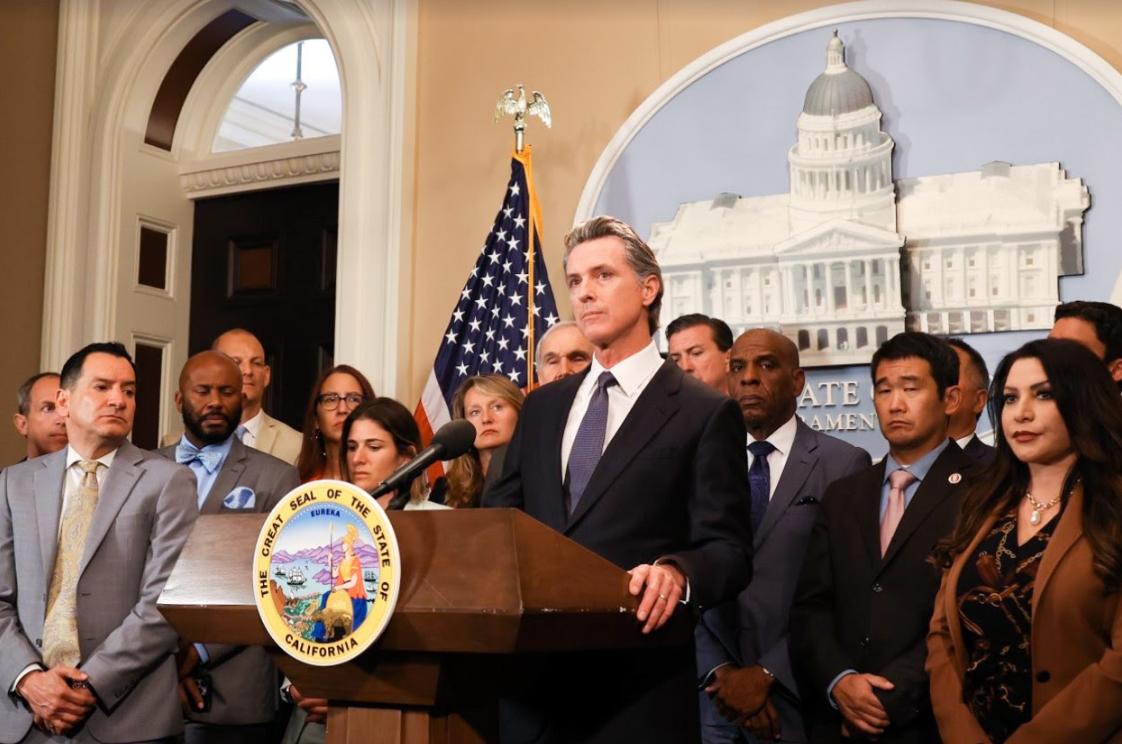
SACRAMENTO – In a final flurry of activity this past week and on the final day to take action with legislation on his desk, California Governor Gavin Newsom for signed multiple bills into law ranging from SB 1194 allows for multi-stall gender-neutral bathrooms in cities that choose to pass such an ordinance to legislation to protect Civil Rights, Support Community Living for Californians with Disabilities.
California to Speed Graduation, Offer Debt Cancellation at Community Colleges
“California is increasing resources, adding services, and advancing equity to boost graduation and transfer rates throughout our higher education systems,” said Governor Newsom.
The bills signed will:
- Ensure that students attending California Community Colleges enroll directly into transfer-level math and English courses, if their program requires it or they are seeking to transfer.
- Expand supervised tutoring offered for foundational skills and transfer-level courses.
- Offer debt cancellation to encourage students to re-enroll and enroll at community colleges, building on budget appropriations.
Senate Bill 1194 Public Restrooms: Building Standards Which Allows for Multi-Stall Gender Neutral Bathrooms
Newsom signed the bill into law on Thursday allowing cities to adopt the new regulations for multi-stall gender-neutral bathrooms by adopting ordinances. In addition, and to afford additional discretion to communities, cities can exclude certain occupancies from the bill’s requirements.
“I am overjoyed that the Governor has signed SB 1194 into law!” said City of West Hollywood Mayor Pro Tempore Sepi Shyne. “I was proud to co-sponsor the City of West Hollywood Multi-Stall Gender Neutral Bathroom Ordinance, which made us the first city in the United States to move to require equity and safety in bathroom access for people with disabilities who have opposite sex caretakers, our transgender, non-binary, and gender non-conforming siblings, and same sex and single parents of opposite sex children. I worked with Senator Ben Allen and his staff, my colleague Councilmember John M. Erickson, and our City legislative staff to help shepherd SB 1194 through the legislature. California is now the first state in the nation to give cities local control to make the same choice West Hollywood did.”
Legislation to Protect Sexual Assault Victims’ DNA Signed into Law
Newsom signed into law Senator Scott Scott Wiener (D-San Francisco)’s Senate Bill 1228, the Genetic Privacy for Sexual Assault Victims Act. It will take effect on January 1, 2023.
SB 1228 protects sexual assault survivors and other victims by prohibiting the retention of DNA profiles collected from victims by local law enforcement agencies — including rape kits for sexual assault survivors. It also prohibits victims’ DNA from being used for any purpose other than identifying the perpetrator of the crime. Thus, a victim’s DNA could not be used in the future against the victim.
“Today, California showed once again that we stand with survivors of sexual assault,” said Senator Wiener. “Sexual assault exams are key to law enforcement finding perpetrators. It is critical that we protect the integrity of that process and ensure that survivors’ DNA is kept private. This law is a meaningful change for those going through what are likely some of the worst moments of their life.”
SB 1228 is sponsored by the San Francisco District Attorney’s Office, the Prosecutors Alliance of California, and Black Women Revolt, an anti-domestic violence advocacy and resource group for Black women.
These protections help ensure the privacy of sexual assault survivors and promote public safety by encouraging survivors to report sexual violence. If a sexual assault survivor believes their rape kit DNA can be used against them in the future, they will have one more reason not to come forward and undergo an invasive rape kit examination.
SB 1228 was introduced following the discovery that a local law enforcement agency was retaining DNA collected from sexual assault survivors in its quality assurance database and then searching that database to incriminate survivors in unrelated crimes. Since the discovery of this practice, advocates for sexual assault survivors and victim rights have widely condemned the practice and called for legislative action. Congressman Adam Schiff has called for a federal investigation.
When victims report a sexual assault, they can consent to a sexual assault examination, also known as a rape kit. During this examination, biological evidence from bodily fluids, fingernail scrapings, and bite and scratch marks is collected from the victim’s body. The victim submits their own DNA sample in order to exclude their DNA from an investigation. In addition, reference samples of those who have close contact with the survivor—such as consensual sexual partners, family members, or other people living in the same household—may be collected as well to differentiate their DNA from that of the perpetrator.
Sexual assault is significantly under-reported; fewer than a quarter of sexual assault survivors come forward to report to police. Of those survivors who do report, only a small percentage undergo the highly invasive process of sexual assault testing. Victims of sexual assault consent to their DNA collection for this purpose, not so that their DNA will be retained in a local law enforcement database permanently to be searched years later. Using victims’ DNA in order to potentially incriminate them in the future further dissuades sexual assault survivors from undergoing what is already a very difficult process.
SB 1228 protects sexual assault survivors and other victims by prohibiting the DNA profiles collected from victims from being used for any purpose other than aiding in identifying the perpetrator. Local law enforcement agencies will also be prohibited from retaining and then searching victim DNA to incriminate them in unrelated crimes.
Federal law already prohibits the inclusion of victims’ DNA in the national Combined DNA Index System (CODIS). However, there is no corresponding California state law to prohibit local law enforcement databases from retaining victims’ profiles and searching them years later for entirely different purposes. This legislation would remedy that by requiring DNA samples taken from victims to be used only for the sexual assault investigation. It would prohibit DNA samples from being included in any database that allows for a sample to be matched with DNA profiles obtained from crime scenes.
The bill would also instruct the Committee on Revision of the Penal Code to study whether additional steps are needed to protect the privacy of Californians who have submitted DNA samples to law enforcement, and determine whether a forensic oversight board is needed.
Assemblymembers Reggie Jones-Sawyer and Phil Ting are co-authors of this legislation.
Legislation to End Wrongful Convictions Due to Faulty Expert Witness Testimony Signed into Law
Newsom signed into law Senator Scott Wiener’s (D-San Francisco) Senate Bill 467. SB 467, the End Wrongful Convictions Act, amends the standards used for evaluating expert testimony and forensics in court post-conviction. This law will take effect on January 1, 2023..
“The End Wrongful Convictions Act will get innocent people out of prison,” said Senator Wiener. “When anyone spends even a day in prison for a crime they did not commit, it’s a terrible miscarriage of justice. Now, we’ll have more tools to help exonerate anyone wrongfully convicted on the basis of outdated or flawed science. This is a victory for the integrity of our criminal justice system.”
“Senator Wiener continues to be a champion for the innocent by authoring and advocating for laws that both help the wrongfully convicted regain their freedom and prevent wrongful convictions from happening in the first place,” said Melissa O’Connell of the California Innocence Coalition.
SB 467 clarifies that the definition of false testimony includes expert opinions undermined by the state of scientific knowledge and creates a path for the wrongfully convicted to obtain justice when their convictions were based on expert opinions about which a significant dispute has emerged or further developed regarding its validity. The California Supreme Court has long recognized that “[l]ay jurors tend to give considerable weight to ‘scientific’ evidence when presented by ‘experts’ with impressive credentials” but emphasized “scientific proof may in some instances assume a posture of mystic infallibility in the eyes of a jury . . .”(People v. Kelly (1976) 17 Cal.3d 24, 31-32.)
Unreliable forensic science remains a leading cause of wrongful convictions, occurring in 45% of DNA exoneration cases nationwide, 24% of all exonerations in the nation and 15% of the California exoneration cases known since 1989. In these cases, “expert” testimony that was either flawed or false forensic science, or relied on scientific methods that are widely debated within the scientific community provided critical evidence leading to the conviction. In California, 70% of these innocent men and women were given life sentences; one was sentenced to death.
SB 467 is part of a larger slate of the California Innocence Coalition’s reform bills. Previously, Senator Wiener authored SB 923, which ensures that law enforcement use evidence-based procedures when obtaining eyewitness identification. Eyewitness misidentification is a leading contributor to wrongful convictions proven with DNA evidence. Before SB 923 was signed into law, California had no statewide best practices for eyewitness identification and there were no evidence-based standards in place. With the passage of SB 467, California takes a giant step forward to address concerns set forth by the scientific community itself as well as to allow our courts to remain lockstep with advancements in science
SB 467 is sponsored by the California Innocence Coalition, which includes the Northern California Innocence Project, the California Innocence Project and the Loyola Project for the Innocent.
Legislation to Expedite Sustainable Transportation Projects Signed into Law
Newsom signed into law Senator Scott Wiener (D-San Francisco)’s Senate Bill 922. It will become law on January 1, 2023. SB 922 extends and improves upon Senator Wiener’s previous legislation (SB 288, 2020) to expedite bike, pedestrian, light rail, and rapid bus projects by exempting these environmentally sustainable projects from the California Environmental Quality Act (CEQA). SB 922 will accelerate approval of sustainable, climate-friendly transportation projects.
In the short time – just 18 months – that SB 288 has been in place, 15 projects have been streamlined in various parts of the state. Another 20 projects are currently under consideration for streamlined treatment. Transit agencies from around the state, including the San Francisco Municipal Transportation Agency, the Los Angeles Department of Transportation, AC Transit, and CalTrain, have invoked this streamlining. Other transit agencies that have made use of SB 288 include: Yuba-Sutter Transit, Tahoe Transportation District, Napa Valley Transportation Authority, Santa Rosa CityBus, Fairfield and Suisun Transit, Monterey-Salinas Transit District, Culver City CityBus, Long Beach Transit, and Riverside Transit Authority. Streamlined projects include protected pedestrian walkways and bike lanes, bus rapid transit projects, electric vehicle charging for buses, and more.
“Increasing sustainable transportation options – like biking, walking, and public transit – is incredibly important when it comes to reducing carbon emissions and fighting climate change,” said Senator Wiener. “SB 922 continues our work to make it easier to build these projects more quickly and at lower cost, and will get people out of their cars. This is great news for California and for our climate. Thank you, Governor Newsom.”
Free Books for Children, Support for Student Athletes and Creative Expression
Newsom signed SB 1183 by Senator Shannon Grove (R-Bakersfield), expanding Dolly Parton’s Imagination Library Program to children statewide. Under the initiative, launched to inspire a love of reading at an early age, California children under the age of five will be eligible to enroll in the program to receive a free book every month through a direct mail program starting in June 2023.
Joined virtually by award-winning rappers, record producers and record industry executives, Governor Newsom signed AB 2799 by Assemblymember Reginald Byron Jones-Sawyer, Sr. (D-Los Angeles), a first-in-the-nation bill that limits the use of creative expression like rap lyrics as evidence in criminal cases to protect against bias.
In a virtual ceremony, Governor Newsom signed AB 2747 by Assemblymember Adrin Nazarian (D-North Hollywood), which will make Olympians, Paralympians and elite Olympic hopefuls who train in California eligible for in-state tuition.
California Empowers Students
The Governor signed SB 997, SB 955, and SB 291 empowering students in California by:
- Providing a seat at the table in local accountability plan processes.
- Allowing an excused absence from school to engage in civic opportunities in their communities.
- Adding two pupils with exceptional needs to the Advisory Commission on Special Education.
Newsom also signed AB 2806 by Assemblymember Blanca Rubio (D-Baldwin Park) ensuring equitable treatment of children in state preschool and child care programs by prohibiting suspensions and expulsions except as a last resort. When a child is suspended or expelled, they do not receive the benefits that early learning and education provides and this disportionately impacts toddlers and preschoolers of color. AB 2806 aims to change this and support California’s youngest learners.
Additionally, the Governor signed SB 1047 by Senator Monique Limόn (D-Santa Barbara) increasing access and stability for families to get the care and learning opportunities their kids need and are critical for young children to succeed.
Newsom Signs Legislation to Protect Civil Rights, Support Community Living for Californians with Disabilities
Newsom signed AB 1663 by Assemblymember Brian Maienschein, which reforms California’s probate conservatorship system to enable disabled and older people needing support to care for themselves to pursue supported decision-making as a less restrictive alternative to conservatorship. The bill also makes it easier to end a conservatorship.
“Our state is committed to protecting civil rights and lifting up every Californian with the supports they need to thrive in their community,” said Newsom. “This measure is an important step to empower Californians with disabilities to get needed support in caring for themselves and their finances, while maintaining control over their lives to the greatest extent possible.”
AB 1663 establishes supported decision-making in statute as an alternative to probate conservatorship. This is a process in which adults with intellectual, developmental, dementia, and other disabilities who need support to care for themselves or their finances can consult with trusted supporters while making choices about their life, without jeopardizing their self-determination. The bill also requires that alternatives to conservatorship are included for consideration in a petition for conservatorship, and requires courts to provide conservatees with information regarding the rights that they retain. Under AB 1663, courts are allowed to terminate a conservatorship without a hearing if both the conservatee and conservator agree to termination.
“Everyone deserves to have control over the choices they make in their daily lives, including individuals with disabilities. AB 1663 prioritizes that right by emphasizing less-restrictive alternatives to probate conservatorships, specifically Supported Decision-Making. I am grateful that the Governor signed this important legislation today,” said Assemblymember Brian Maienschein (D-San Diego).
State law allows the courts to appoint a conservator for an adult when a third party such as law enforcement or Adult Protective Services is concerned about the health, safety or welfare of a person and there has been a comprehensive review of the individual’s circumstances. Information about recent actions by the California Department of Developmental Services (DDS) to support individuals conserved by DDS can be found here.
Governor Newsom also signed AB 1195 by Assemblymember Cristina Garcia (D-Bell Gardens) which facilitates the hiring of people with disabilities within state government through the Limited Examination and Appointment Program (LEAP).
California raises wage replacement for new parents, sick workers
Newsom has signed a bill that will increase the amount of money workers receive under the state’s paid family and medical leave program, providing a boost that supporters say will ensure lower wage workers are not locked out of a benefit they are already paying for.
Beginning in 2025, the state will pay up to 90% in wage replacement for new parents and those who need to take time off to care for a seriously ill family member or themselves. Senate Bill 951 by Sen. María Elena Durazo (D-Los Angeles) also ensures that the wage replacement will remain between 60% and 70% during the next two years after the rate was scheduled to return to 55% beginning Jan. 1.
California Expands Support for Working Families
Newsom today signed legislation to help hard-working Californians access family and disability leave benefits. SB 951 by Senator María Elena Durazo (D-Los Angeles) will boost leave benefits for lower- and middle-income employees to cover more of their regular income while they take much-needed time off to care for loved ones.
“California families and our state as a whole are stronger when workers have the support they need to care for themselves and their loved ones,” said Governor Newsom. “California created the first Paid Family Leave program in the nation 20 years ago, and today we’re taking an important step to ensure more low-wage workers, many of them women and people of color, can access the time off they’ve earned while still providing for their family.”
SB 951 extends increased wage replacement rates for State Disability Insurance and Paid Family Leave that were set to sunset at the end of the year. Under the legislation’s phased increase in benefits, by 2025, workers earning less than the state’s average wage could receive up to 90% of their regular wages while taking leave.
SB 951 builds on the Governor’s action since taking office to bolster access to workplace leave, including legislation to expand job-protected family leave to millions more Californians, extend paid family leave benefits for a newborn child from 6 to 8 weeks and expand paid sick leave in response to COVID-19.
Yesterday, Governor Newsom signed AB 1041 by Assemblymember Buffy Wicks (D-Oakland) which enables workers to take paid sick leave or family leave in order to care for any person designated by the employee, including non-family members. The Governor also signed AB 152 to extend COVID-19 Supplemental Paid Sick Leave through the end of the year and AB 1949 by Assemblymember Evan Low (D-Campbell) which allows workers to take job-protected bereavement leave.
Newsom Signs Legislation to Crack Down on the Sale of Stolen Goods Online
With online marketplaces selling stolen merchandise, Governor Newsom today signed legislation to strengthen transparency rules for high-volume, third-party sellers and provide greater tools for law enforcement to identify stolen items, often taken from doorsteps or shoplifted at retail stores.
“We are tightening the spigot, reducing the sale of online illegal merchandise,” said the Governor. “By empowering consumers with the ability to identify stolen items for sale online and providing greater transparency for high-volume sellers, we are tackling this problem at the source. Thanks to the work of my partners in the Legislature, in California, we are addressing the crime we see affecting the nation through a multipronged approach focused on deterrence, enforcement, and prevention.”
Both SB 301 by state Senator Nancy Skinner (D-Berkeley) and AB 1700 by Assemblymember Brian Maienschein (D-San Diego) work to address the online sale of stolen merchandise. SB 301 calls for online marketplaces to require high-volume third-party sellers to provide greater information to protect consumers. These requirements include contact and bank account information, as well as a seller’s physical address. AB 1700 directs the Attorney General’s Office to dedicate a section of its website for individuals to report items found on online marketplaces, identified as possible stolen goods. The Attorney General will share this information with local law enforcement agencies. The bill will also require online marketplaces to display a link to the Attorney General’s webpage.
The Governor also signed AB 2294 by Assemblymember Reginald Byron Jones-Sawyer Sr. (D-Los Angeles), which gives law enforcement the ability to keep in custody individuals suspected of organized retail theft. Under the current process, an individual arrested for a misdemeanor is typically released with a written notice or citation. This bill will allow for law enforcement to keep in custody a person arrested for a misdemeanor if they have been convicted of theft from a store in the last six-months, or if there is probable cause that the individual is guilty of participating in organized retail theft.
Today’s bill signing comes on the heels of the Governor’s announcement of California’s Real Public Safety Plan, which includes hundreds of millions in funding to provide grants for local District Attorneys to address retail theft, establish a statewide organized theft team in the Attorney General’s Office, make permanent and expands the Organized Retail Theft Task Force led by CHP, and create the largest gun buyback program in the country. The plan also includes grants for local law enforcement, prosecutors, and small businesses victimized by retail theft.
Fresh Start Act, to Remove Outstanding Restitution as a Barrier to Expungement
Newsom signed into law Senator Scott Wiener’s (D-San Francisco) Senate Bill 1106, the Fresh Start Act. It will become law on January 1, 2023.
SB 1106 helps people clear their criminal records by ensuring outstanding restitution and restitution fines are not a barrier to expungement. Currently, people across California are frequently denied record sealing and expungement because they are poor and cannot afford to pay outstanding restitution and restitution fines. Restitution debt is often the only thing holding someone back from clearing their record and finding a job and housing. This exacerbates the cycle of poverty and criminalization of Black and brown communities, who are disproportionately impacted by the criminal legal system.
“This is a huge moment for anyone who has served their time and is looking to start over fresh,” said Senator Wiener. “Now, outstanding restitution debt won’t be a barrier to getting one’s record cleared. Formerly incarcerated people will be able to more easily access housing and jobs, which will ultimately help them pay off this debt. Thank you, Governor Newsom, for seeing the value of a fresh start.”
Two types of restitution payments are frequently imposed on anyone convicted of a crime. The first is a restitution fine, which is a fixed amount charged to anyone with a conviction regardless of the crime and its impact. Restitution fines can run in the thousands and even more than $10,000. The second is direct restitution, by which a court can order someone to compensate a victim for the harm caused to the victim.
When setting these amounts, courts are not required to take into account a person’s ability to pay that restitution. This means that victims of crime, who are awarded restitution, overwhelmingly receive either nothing or a small percentage of the restitution because a defendant lacks the resources to actually pay it.
Current law allows courts to deny a request for expungement of a conviction — even if the individual is otherwise eligible for expungement — if they have any outstanding unpaid restitution. A court can deny expungement on this basis even if the defendant is living in poverty.
This kind of barrier to reentry does not increase the likelihood that someone will pay off their restitution. In fact, blocking someone from clearing their record makes it even less likely that they’ll ever be in a position to pay restitution. A 2014 study by Stanford University and the San Jose State University Record Clearance Project found that the estimated benefits of expungement outweigh costs by about $5,800, per person, in one year – nearly $6,500 in today’s dollars.
Under SB 1106, people who have served their time would be able to clear their criminal records despite owing restitution, if they otherwise meet the criteria for that relief. SB 1106 does *not* cancel a person’s restitution debt. Rather, the legislation allows a person to clear their record and move forward in life despite being too poor to pay restitution.
The bill is sponsored by a multi-regional coalition focused on modifying the court fee system and ending wealth extraction through the criminal legal system, which disproportionately impacts Black and Brown communities, inflicting life-long monetary subjugation on them. The coalition is made up of legal advocates, formerly incarcerated people, policy experts, and movement building organizations led by impacted people.
Newsom signs game-changing elections bill, The Ballot DISCLOSE Act
Newsom signed AB 1416 – The Ballot DISCLOSE Act – a bill that will have a major positive impact on ballot measure transparency. All statewide ballot measures will now include a list of supporters and opponents on the ballot itself. Lead authors were Assembly Member Miguel Santiago (D-Los Angeles) and Senator Henry Stern (D-Calabasas).
“This bill is a colossal game changer for California elections because voters will now be able to make more informed choices on ballot measures,” said Assembly Member Santiago. “Big money in politics continues to capitalize on the lack of ballot measure transparency, which directly affects the outcome of elections. As more and more ballot measures appear on general election ballots, it is imperative voters have the information they need to cast an informed vote on state and local ballot measures. The Ballot DISCLOSE Act will bring greater transparency and democracy to the ballot box on Election Day.”
“This law will vastly improve voters making an informed choice when voting, and finally root out the special interest that lurk in the shadows seeking to mislead the public,” said Senator Stern.
“Governor Newsom’s signature of the Ballot DISCLOSE Act will ensure that every Californian voter will know key supporters and opponents of ballot measures when they vote, just like every legislator when they vote and the Governor when he signs or vetoes bills. This will be true no matter what voters’ life circumstances and no matter how lopsided the campaign spending,” said Trent Lange, President of the California Clean Money Campaign, sponsor of AB 1416. “Every Californian who cares about fairness in democracy owes a debt of gratitude to Governor Newsom, Assemblymember Miguel Santiago, Senator Henry Stern, and all the other bold leaders in the California Legislature who helped AB 1416 pass.”
AB 1416 will bring greater transparency to ballot measures while providing voters with relevant information on Election Day. Specifically, this bill would require a voter’s ballot to include a short list of those who support and oppose each statewide ballot measure, submitted by the proponents and opponents who submit the official ballot arguments. Each list is limited to no more than 125 characters, with rules to avoid political parties and newly created “sham organizations” from being listed. Local ballot measures will be required to have similar lists of supporters and opponents, but with Board of Supervisors allowed to opt out of local measures if they choose.
This bill will take effect on January 1, 2023.
Newsom signs bill to raise fines on health plans for patient protection violations
The Governor signed SB 858 by Senator Scott Wiener updating penalty amounts that the state can levy on health plans that don’t meet state consumer protection standards. It will go into effect on January 1, 2024.
Health plan accountability is critically important: current fine levels were set in the 1970s and are so low they can be viewed as a cost of doing business. As a result, health plans, at times, illegally deny or delay coverage. For example, Kaiser Permanente has yet to come into compliance with a previous law authored by Senator Wiener (Senate Bill 221) — requiring timely access to mental health treatment — resulting in a strike by Kaiser mental health professionals.
“Californians rely on their health insurance to cover critical, even life-saving, care, and we must hold health plans accountable for following the rules and providing timely and adequate coverage,” said Senator Wiener. “California’s low, outdated fine levels allow health plans to view these fines as a mere cost of doing business. SB 858 makes clear that when we pass a law requiring coverage, we mean it.”
“For years health care corporations have been skirting consumer protection laws with minimal consequences. This new law will change the behavior of these health plans and ensure access to needed care for Californians,” said Diana Douglas, Health Access California’s director of policy and legislative advocacy.
Despite strong consumer protections for Californians in health plans regulated at the Department of Managed Health Care (DMHC), many have still been denied or delayed in getting medically necessary services. Yet fine amounts for violations related to grievance handling and other specific consumer protections had not been updated for decades, all while health insurance premiums have not just doubled, but quadrupled since 1999. Some of these fine amounts had not been updated since 1975 when gas was 59 cents a gallon.
The new law increases the maximum fines from $2,500 per violation to $25,000 when they violate standards such as timely access to care, adequate network standards, language access, behavioral health care services, gender-affirming care, or other consumer protections.
Even for the biggest, headline-making penalties in recent years, the fines didn’t necessarily match the severity and breadth of the violations. Just this year, L.A. Care was fined a historic $35 million by DMHC for failure to appropriately handle grievances and for a severe backlog of authorization requests for services over a five year span. However, with over 67,000 grievances and over 9,000 requests for authorization, this seemingly large fine amounted to only a few hundred dollars per instance—essentially less than a speeding ticket for delaying or denying care to a patient. Meanwhile, the plan reported a tangible net equity of over $1 billion, an amount $923 million over that which is required by law
This new law will give DMHC the additional authority to levy higher fines and impose corrective action plans when necessary. It will also modernize penalty amounts every 5 years, and updates the methodology to ensure the penalty amounts reflect the true harm caused to enrollees.
AIDS and HIV
Congresswoman Maxine Waters introduces new resolution for National Black HIV/AIDS Awareness Day
H.Res.1039 supports more funding, resources and awareness for Black American communities, who are disproportionately impacted by HIV/AIDS.

Today is National Black HIV/AIDS Awareness Day. Advocates established this day of awareness on Feb. 7, 1999, and nearly 30 years later, Black communities in the U.S. continue to be disproportionately impacted by HIV.
On Wednesday, California Congresswoman Maxine Waters introduced H.Res.1039, a resolution that supports the goals of National Black HIV/AIDS Awareness Day and calls for a collective commitment to address disparities Black people with HIV face. Waters represents the state’s 43rd congressional district, a majority Black and Brown population comprising South L.A. cities like Hawthorne, Gardena, and Inglewood.
In the resolution, Waters urges state and local government officials, as well as their public health agencies, to acknowledge the importance of this awareness day and encourage their constituents to get tested for HIV. The resolution also requests that the Secretary of Health and Human Services prioritize distributing grant funding to minority-led, HIV organizations and community-based approaches to fighting HIV stigma, LGBTQ+ discrimination, and racism.
In 2023, young Black men accounted for 47% of new HIV diagnoses among youth, while young white men made up 3% of these diagnoses, according to a new Williams Institute report. Black women also have the highest HIV diagnosis rate among women, and Black community members overall represent 38% of new HIV diagnoses and 39% of people living with HIV in the U.S., despite being only 12% of the national population.
Beyond the disproportionate rates of infection and diagnosis amongst Black Americans, these communities also face greater difficulties in accessing the medical care needed to prevent and treat HIV. In the same year, white Americans were 7 times more likely to access Pre-exposure Prophylaxis (PrEP) compared to Black Americans, a data point that affirms racial and healthcare inequities Black people continue to face in the U.S.
“[This] is a day to commemorate the impact of HIV/AIDS on Black Americans and encourage continued efforts to reduce the incidence of HIV, eliminate health disparities, improve access to care and treatment, and show support for all those who are living with HIV/AIDS,” said Congresswoman Waters, in a press release.
Waters has been an advocate for people impacted by HIV/AIDS since the peak of the crisis in the 1980’s. In 1998, she worked to establish the Minority AIDS Initiative, which expanded national prevention and treatment efforts in support of minority communities, who remain disproportionately impacted by HIV. In 2025, Waters introduced the “HIV Prevention Now Act” as well as the “PrEP and PEP are Prevention Act,” to increase prevention efforts and reduce health insurance barriers to access preventative resources, respectively.
H.Res.1039 is the latest addition to the congresswoman’s efforts to raise awareness for Black and other minority communities impacted by HIV/AIDS, and to fund and support on-the-ground efforts that prioritize their care and wellbeing.
The resolution is endorsed by various LGBTQ+ organizations mobilizing for communities impacted by HIV, including AMAAD Institute (Arming Minorities Against Addiction and Disease), LA Pride, AIDS Foundation Chicago, and PFLAG National. The resolution is also co-sponsored by 29 other U.S. representatives, including fellow California congressmembers Robert Garcia, Laura Friedman, Nanette Barragán, Sydney Kamlager-Dove, Lateefah Simon and Mark Takano.
H.Res. 1039 has been referred to the House Committee on Energy and Commerce, and currently awaits further action.
Kristie Song is a California Local News Fellow placed with the Los Angeles Blade. The California Local News Fellowship is a state-funded initiative to support and strengthen local news reporting. Learn more about it at fellowships.journalism.berkeley.edu/cafellows.
California
Hate crimes targeting transgender and gender nonconforming people have tripled since 2013
The Williams Institute is examining increasing anti-transgender and anti-gender nonconforming violence, as well as as the policies shaping it.
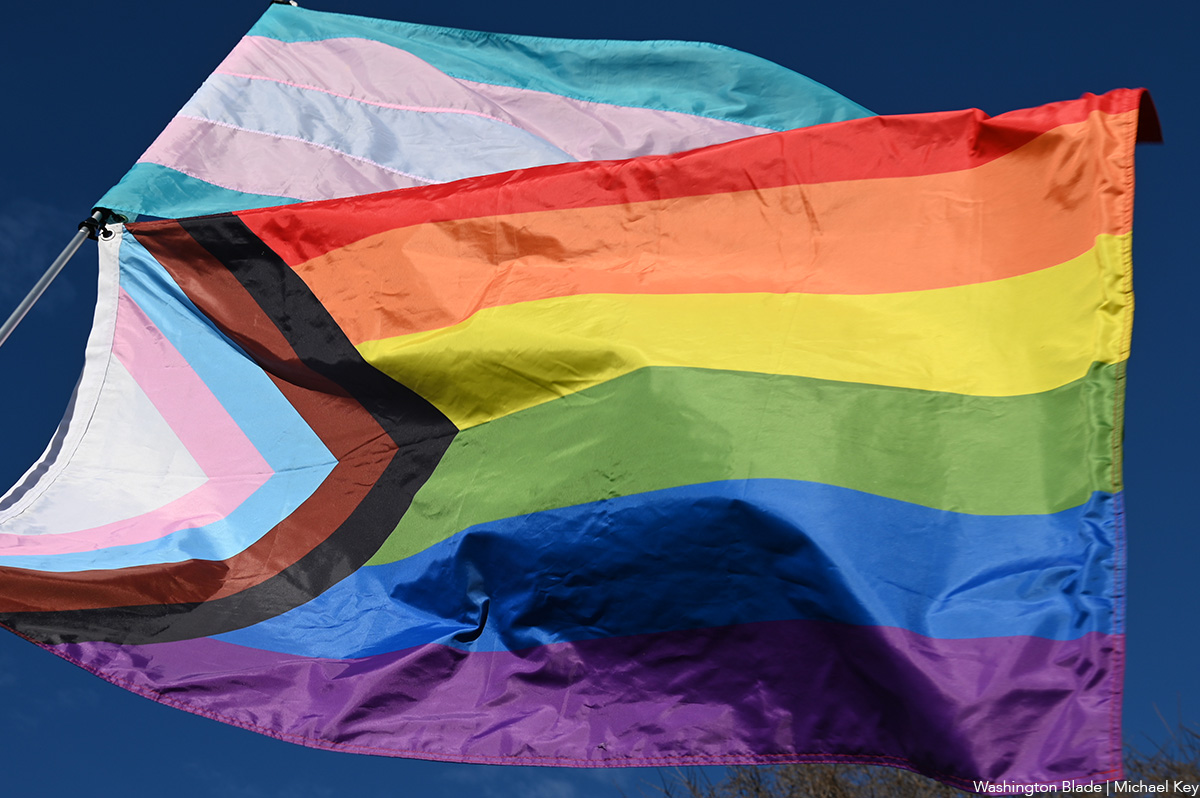
On Dec. 17th, the Williams Institute found that hate crimes targeting people based on their gender identity have more than tripled in California since 2013. The research center’s latest report on statewide gender identity hate crimes utilizes data reported to the California Department of Justice from 2001 to 2024, and outlines the increasing violence transgender and gender nonconforming people face.
Hate crimes motivated by gender identity and sexual orientation have made up 23% of all reported hate crimes in California since 2001, and nearly half of these incidents between 2013 and 2024 were reported in Los Angeles County alone. The study’s lead author, Jordan Grasso, points to several possible reasons for such high numbers in L.A., including the county’s overall population size, its large transgender community, and local law enforcement policies around identifying and reporting hate crimes.
It’s difficult to compare these numbers across counties, though, Grasso explained to the Blade, since practices like reporting, investigating, and recording incidents “are shaped at the local level and can vary widely from agency to agency.”
While these practices can vary, one overarching statewide shift occurred in 2013, when the California Department of Justice added “anti-gender nonconforming” as its own bias subcategory: one that was separate from “anti-transgender.” Since then, over 500 gender identity hate crimes targeting transgender and gender nonconforming people have been recorded in California.
This marked a step towards creating more nuance in the ways gender identity hate crimes are understood, reported, and responded to by law enforcement officials. Five years later, in 2018, California passed a law that required all law enforcement trainees to receive training on sexual orientation and gender identity.
“This matters because once someone reports a hate crime, officers who have a better understanding of these issues may be more likely to recognize the incident as a hate crime and record it as such, rather than treating it as a general offense,” Grasso wrote to the Blade.
As transgender and gender nonconforming people face increasing violence, they are also reporting lower levels of trust in police. They are more likely than cisgender people to experience discrimination, harassment, and bias when seeking help from law enforcement, which then discourages them from seeking help at all.
“There are clear gaps between transgender and nonbinary Californians’ experiences of violence and what shows up in official hate crime reports,” Grasso wrote. “These gaps are shaped in large part by longstanding and persistent negative interactions between LGBTQ people, especially transgender people, and law enforcement.”
Grasso found in another recent study that, while almost 60% of transgender and nonbinary survey respondents reported experiencing violence or harassment in the last year, their self-reported experiences may outnumber actual reported hate crimes. “This suggests that officially recognized hate crime reports capture only a small fraction of the violence and victimization that transgender and nonbinary people experience across the state,” they explained.
These gaps widen even more when considering transgender and gender nonconforming people who experience intersectional forms of hate. Transgender women, notably, face a disproportionate amount of violence and harassment, but current law enforcement recording policies around gender identity hate crimes can water these facts down.
Grasso explained that when law enforcement officers make hate crime reports, they are required to note a single “most serious bias,” a practice that aims to create one digestible explanation out of what are often very layered and complicated incidents of violence. “This has two consequences,” Grasso wrote. “First, gender identity hate crimes are likely undercounted, especially among people who are multiply marginalized. Second, patterns of victimization among people who are targeted for multiple, intersecting reasons—such as race and transgender identity—remain largely invisible.”
These limitations fuel new solutions, and several public policy recommendations are detailed in the report. Many of these suggestions urge improved data collection and access: namely, that law enforcement officials explain all applicable bias motivations in their hate crime reports to California’s Department of Justice. This way, researchers can better understand the scope and impact of those who are targeted by multiple biases.
The report’s authors are also supportive of the development of alternative options for reporting hate crimes because of the stigma and fear transgender and gender nonconforming people experience with law enforcement. Grasso points to CA vs. Hate, the California Civil Rights Department’s non-emergency resource and reporting hotline.
The local offshoot LA vs. Hate similarly provides a community-centered and non-law enforcement system that encourages Angelenos to report the hate crimes they experience and access various social services offered by grassroots organizations. This trust in community solutions also allows researchers to better comprehend and respond to increasing violence based on gender identity, as people are more willing to lean on these alternatives to share their stories.
Kristie Song is a California Local News Fellow placed with the Los Angeles Blade. The California Local News Fellowship is a state-funded initiative to support and strengthen local news reporting. Learn more about it at fellowships.journalism.berkeley.edu/cafellows.
California
Ricardo Lara, John Heilman inducted into Victory Institute’s Hall of Fame
Induction took place in D.C. on Saturday
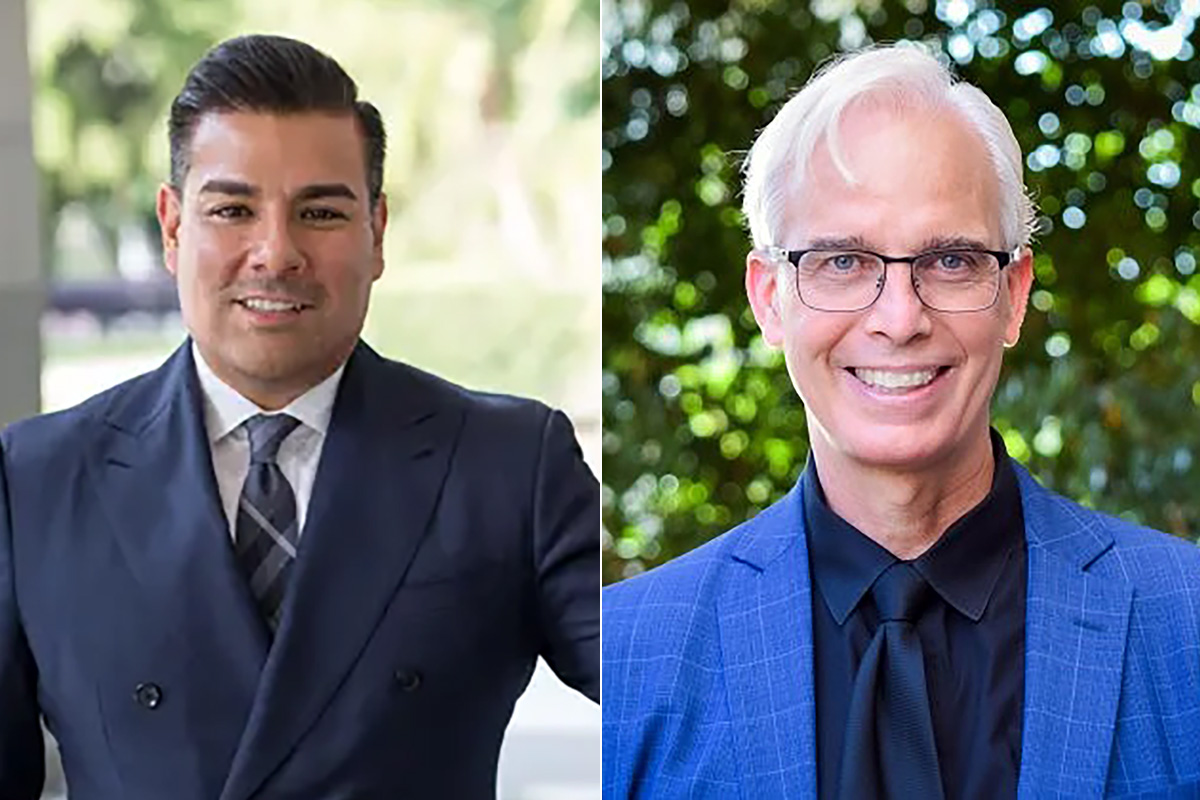
The LGBTQ+ Victory Institute on Saturday inducted California Insurance Commissioner Ricardo Lara and West Hollywood Vice Mayor John Heilman into its LGBTQ+ Political Hall of Fame.
The inductions took place during the Victory Institute’s annual International LGBTQ+ Leaders Conference in D.C.
U.S. Rep. Robert Garcia (D-Calif.), San Diego Mayor Todd Gloria, San Leandro Councilmember Victor Aguilar Jr., are among those who attended the conference. Evan Low, the LGBTQ+ Victory Institute’s president, served in the California State Assembly from 2014-2024.
Former state Senate President Pro Tempore Toni Atkins, former Assembly Speaker John Pérez, former state Sen. Christine Kehoe, former Palm Springs Mayor Ron Oden, Harvey Milk, a member of the San Francisco Board of Supervisors who was the state’s first openly gay elected official, and José Sarria, who ran for the San Francisco Board of Supervisors in 1961, have also been inducted.
California
Prop 50 has passed, with overwhelming support from local voters and LGBTQ+ advocates
Over 5 million Californians voted in support of the congressional redistricting measure.

Yesterday, on the night of the California statewide special election, polls closed at 8 pm for the vote on Proposition 50, the “Election Rigging Response Act.” The measure was created to combat Texas lawmakers’ plans to redraw their state’s congressional districts ahead of the November 3rd, 2026, midterm elections in order to secure more Republican seats in Congress.
A “yes” vote on Prop 50 would allow California to temporarily redraw its own congressional district maps beginning in 2026, according to the California Voter Information Guide. Since August, Democratic organizers and leaders have been advocating for the passage of the measure as a way to stand up to “cheating” that has been committed by other states.
Last night, over 8 million ballots were counted, and an overwhelming 63.8% of these were votes in favor of Prop 50. In Los Angeles County alone, nearly 2 million ballots were submitted, and 73% of voters sided with passing the measure.
Governor Gavin Newsom celebrated the victory as an act of resistance. “Instead of agonizing over the state of our nation, we organized in an unprecedented way,” he said, in a series of video statements posted online. “We stood tall and we stood firm in response to Donald Trump’s recklessness. And tonight, after poking the bear, this bear roared — with an unprecedented turnout in a special election with an extraordinary result.”
The results have also fueled impassioned LGBTQ+ leaders to keep the fight going, especially as federal legislation continues to put queer and trans communities at risk. “Donald Trump and MAGA Republicans have systematically targeted LGBTQ+ rights, rolling back nondiscrimination protections, erasing our history, and attacking transgender kids and their families,” said Tony Hoang, director of LGBTQ+ civil rights organization Equality California, in a press release. “With the passage of Proposition 50, Californians have sent a clear message: our votes will not be silenced, our voices will not be ignored, and our rights will not be rolled back during a rigged midterm election.”
Advocates have also stressed that Prop 50 sets a precedent in creating more ground in the ongoing battle for increased rights and protections for queer communities. “Tonight’s victory is critical in the fight to secure a pro-equality majority in Congress,” said Kelley Robinson, president of the Human Rights Campaign, another notable LGBTQ+ civil rights group. “This is a victory powered by communities that refuse to be silenced and are unwavering in their commitment to defending democracy.”
California
Newsom announces $140 million will go towards state’s Planned Parenthood centers
This investment supports the organization as it struggles with federal defunding
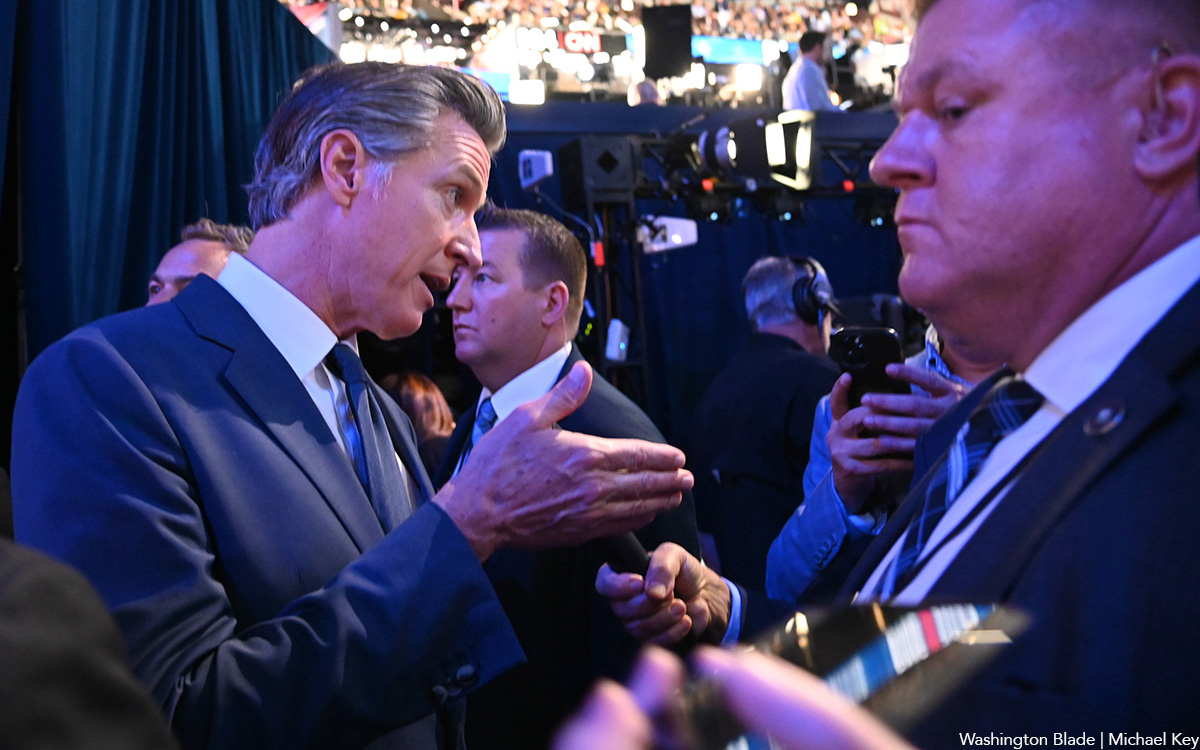
Yesterday, Governor Newsom stated in a press release that he is dedicating over $140 million to keep statewide Planned Parenthood health centers running through the rest of the year until additional resources are identified.
H.R. 1, also known as the “One Big Beautiful Bill Act,” was passed in July and includes detailed notes on the congressional budget, including cuts to various federal agencies and programs. In section 71113 of the bill, federal funding is restricted against “prohibited entities” that provide health services like abortions. Organizations like Planned Parenthood were also blocked from receiving federal reimbursement for providing essential care services to patients enrolled in Medicaid or Medi-Cal.
Planned Parenthood traces its roots to the early 1900s, where it began as a clinic providing birth control resources. Today, there are over 100 Planned Parenthood health centers across California alone, providing abortion services, STI testing and treatment, gender affirming care, birth control options, and other reproductive care services. It has been a lifeline for many in accessing affordable care and education around their reproductive and sexual health.
The effects of H.R. 1 have cut deeply into local communities. As reported by local advocates and government representatives, the neighboring Planned Parenthood of Orange and San Bernardino Counties (PPOSBC) had to eliminate a primary health care service line that provided over 10,000 patients direct access to services like cancer screenings, birth control, and prenatal care.
This recent investment by the state highlights California as a “reproductive freedom state,” Newsom said in a statement. “[This] latest investment continues to show our belief in protecting access to essential health care in times of distress.”
The governor’s next steps in this defense include working with other legislative leaders to identify more long-term solutions for 2026 that will allow Planned Parenthood clinics to continue operating. “While we know Trump and Republicans’ attacks on reproductive health care are escalating, we remain confident that our state leaders will continue to stand with Planned Parenthood patients and providers and ensure they have the support necessary to endure the persistent assaults,” said Planned Parenthood Affiliates of California president Jodi Hicks in a separate statement.
California
Governor Newsom has vetoed two bills aimed to improve PrEP and gender-affirming care access
An update on AB 554 and SB 418, as well as nine other LGBTQ+ bills that the governor passed earlier this week

This Monday, Governor Newsom issued a legislative update on over 150 bills that had passed legislation and were waiting on his decision on whether or not they would be chaptered into law. 11 of these bills advocated for queer community members, including their improved access to healthcare, more privacy rights, greater ease in changing their name and gender markers, as well as the expansion of adoption rights and the inclusion of two-spirit individuals into important funding and resource opportunities.
Two were vetoed.
AB 554: Greater access to HIV/AIDS preventative medicine (Vetoed)
First introduced in February, AB 554 was co-authored by local Assemblymember Mark González and San Francisco Assemblymember Matt Haney. Also known as the Protecting Rights, Expanding Prevention, and Advancing Reimbursement for Equity (PrEPARE) Act of 2025, the bill intended to expand patients’ access to various forms of FDA-approved HIV/AIDS preventative medication. It would have prohibited health insurance plans from subjecting these forms of medication to prior authorization, step therapy, or cost-sharing. It would have also required the state to reimburse local agencies for administering this medicine, alleviating the strain on small clinics to meet the demand of community members in need of PrEP.
Though LGBTQ+ civil rights groups like Equality California rallied support for the bill, it was returned by the governor without a signature. In a veto memo, he wrote that he “wholeheartedly [supports] efforts to ensure affordable and accessible prevention and treatment of HIV/AIDS” but questioned whether the bill would actually increase the affordability of and access to necessary preventative treatment. “By exceeding the cost-sharing provisions under the ACA [Affordable Care Act], this bill would result in increased costs to health plans, which would then be passed on to consumers.”
In response, Assemblymember González wrote to the Blade about his disappointment. Still, he remains hopeful about the state of PrEP access. “I’m deeply grateful to Governor Newsom for his continued partnership and for standing with us in protecting access to PrEP through this year’s budget.”
SB 418: Stronger access to gender-affirming care without discrimination (Vetoed)
Authored by Senator Caroline Menjivar, SB 418 would have required a health care service plan to cover up to a 12-month supply of FDA-approved prescription hormone therapy and the supplies needed by an individual to self-administer this medication without being subjected to utilization management methods like prior authorization.
The bill was also intended to prohibit health insurers from denying a patient the ability to enroll in or renew their health insurance plans based on factors like sex characteristics, intersex traits, and gender identity.
In late January, President Trump released a statement that the federal government would “not fund, sponsor, promote, assist, or support the so-called ‘transition’ of a child from one sex to another.” As healthcare for trans, gender-expansive, and intersex (TGI) individuals becomes increasingly unstable under the current administration, SB 418 aimed to protect TGI community members and their ability to access critical and necessary hormone therapy and gender-affirming care.
In the governor’s veto memo, he wrote that he was “concerned” about the bill’s limitation on utilization management methods. For him, it’s an “important tool [that ensured] enrollees receive the right care at the right time. Prohibiting this cost constraint strategy is likely to result in an increase in enrollee premiums to offset costs incurred by health plans and insurers.”
For Senator Menjivar, this decision was “heartbreaking” as TGI individuals continue to face barriers to vital care. “SB 418 was the most tangible and effective legislative tool introduced this year to help TGI folks weather this political storm,” Menjivar wrote to the Blade. Still, she says that she is committed to continue fighting to secure health care access for TGI community members.
The vetoing of these two bills was a major blow for LGBTQ+ civil rights organizations and advocates. Equality California executive director Tony Hoang wrote about his disappointment in a recent press release. “These bills would have guaranteed that transgender people and their families could continue to access essential medications without disruption and that people at risk of HIV could obtain PrEP quickly and affordably,” wrote Hoang. “The Governor’s decision to veto these measures undermines California’s longstanding leadership in advancing health equity and protecting the LGBTQ+ community.”
But with these setbacks came a number of wins. Governor Newsom passed nine other bills advancing the rights of LGBTQ+ individuals.
SB 59: Confidentiality protections for trans and nonbinary individuals
This bill, authored by Senator Scott Wiener, will ensure that when someone files a legal petition to change their name or their gender marker, these court records are kept confidential. Additionally, SB 59 will prohibit people other than the petitioner to post these confidential records online.
AB 678: Creating an LGBTQ+ inclusive council on homelessness
Created by Assemblymember Alex Lee, AB 678 will require the governor to build an Interagency Council on Homelessness that will form relationships between federal and state agencies with local, on-the-ground coalitions and nonprofit organizations that focus on working with unhoused communities. Together, they will work on creating strategies to end homelessness.
The bill also specifically requires this council to actively work with LGBTQ+ leaders and community members to ensure that the strategies it develops are inclusive and culturally competent.
AB 1525: Restricting disciplinary action against attorneys on the basis of “sensitive services,” which includes gender-affirming care
The California State Assembly’s Committee on Judiciary created this bill to prohibit disciplinary action against attorneys who receive, advocate for, recommend, or enable “sensitive services,” which include health care services for sexual and reproductive health, sexually transmitted illnesses, and gender-affirming care.
AB 1084: Streamlining court processes for name and gender marker changes
Created by Assemblymember Rick Zbur, AB 1084 aims to quicken the process and limit barriers transgender and nonbinary individuals face when filing to change their name and gender marker. The bill will require courts to issue orders within six weeks from when a petition is filed, and without a hearing. The bill will also prohibit others from being able to file an objection to a petitioner’s name or gender marker change.
SB 450: Protecting adoption rights for LGBTQ+ parents and families
Authored by Senator Menjivar, SB 450 will allow queer parents from other states to claim parentage rights to their adopted children born in California. “The signing of SB 450 is a win for LGBTQ+ parents who want what every parent wants, the protection of their legal rights as the parents of their children,” Senator Menjivar wrote to the Blade. “SB 450 clarifies California’s longstanding jurisdiction for adoption proceedings, including confirmatory adoptions, in cases where the families no longer live, or never lived, in the state but the child was born here. This means LGBTQ+ families, who are weighing the options of potentially leaving an affirming state to a Red state for financial reasons, can at least now feel confident that decision won’t cost them their parental rights.”
SB 497: Protecting right to gender-affirming care from out-of-state law enforcement
Authored by Senator Wiener, SB 497 is another bill focused on providing protections for transgender and nonbinary individuals. It will prohibit healthcare providers and service plans from releasing medical information related to gender-affirming care for a patient who is being pursued by out-of-state law enforcement officials. SB 497 would also generally safeguard against out-of-state subpoenas that would prevent a person’s ability to access gender-affirming care.
SB 590: Including chosen family members in paid family leave laws
Authored by Senator Maria Durazo, this bill would alter existing laws around paid family leave, which currently provides wage replacement benefits for up to eight weeks for workers who take time off work to take care of seriously ill family members. SB 590 will expand this definition of family members to include “designated” persons. For many queer individuals, their “chosen family” members are often just as crucial, if not more than, their blood relatives. This bill opens up the scope of what is considered a family member, allowing LGBTQ+ individuals wage protections if they take time away to care for these loved ones.
AB 1487: Expanding equity fund to include two-spirit communities
Co-authored by Assemblymembers Dawn Addis and Mark González, AB 1487 will rename the existing Transgender, Gender Nonconforming, and Intersex Wellness and Equity Fund to the Two-Spirit, Transgender, Gender Nonconforming, and Intersex (2TGI) Wellness and Equity Fund. This will enable the fund to grant financial support to organizations that serve two-spirit and LGBTQ+ tribal community members in a number of services, including: workforce development training, resettlement and social integration programs, youth outreach, healthcare support, and more.
AB 82: Confidentiality protections for patients and providers of reproductive and gender-affirming care
Authored by Assemblymember Chris Ward, this bill will allow reproductive or gender-affirming health care patients and service providers who face violence and harassment because of their association with such care to request that state and local agencies protect the confidentiality of their identities and addresses.
California
Congress members, public health organizations urge Governor Newsom to sign bill amidst threats to PrEP access
Two letters have been sent to the governor, calling on him to sign AB 554 into law by October 12th
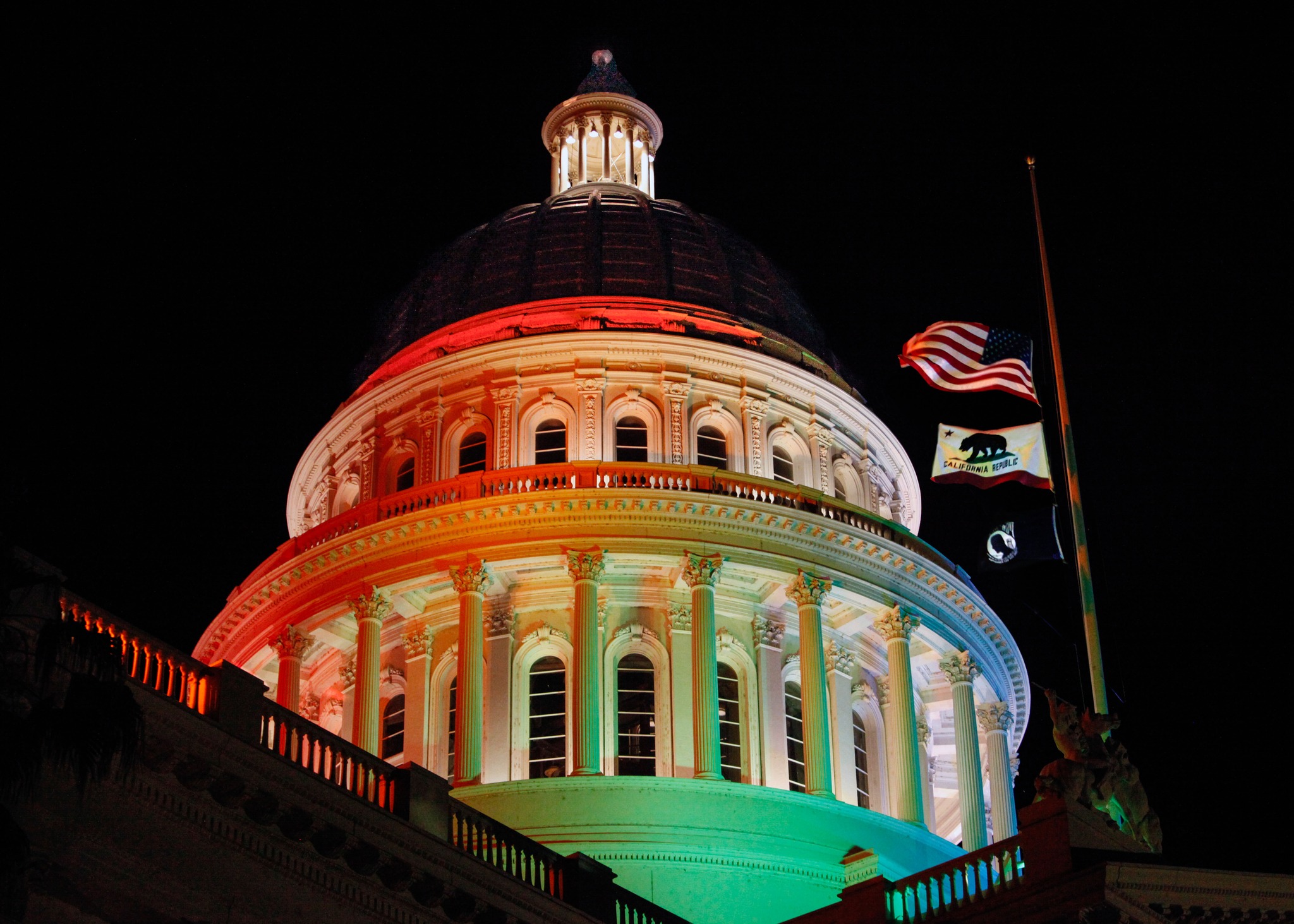
On September 24th, 13 Congress members penned a letter to the governor, asking him to sign AB 554 — or the PrEPARE Act of 2025 — into law. If passed, the bill would strengthen existing state laws around health insurance coverage and access to preventative medication for individuals affected by HIV/AIDS.
AB 554 would require health plans and insurers to cover all FDA-approved PrEP medications, including injectable forms, without prior authorization or step therapy. The bill’s co-authors and supporters emphasize the need to bolster support for impacted individuals and communities, ensuring that they can access effective treatment plans with as few systemic barriers as possible. The bill also includes protections for community clinics, so that they are reimbursed promptly and able to provide medication for impacted people.
In this letter, co-signed by local elected officials including District 42 Representative Robert Garcia, District 43 Representative Maxine Waters, and District 34 Representative Jimmy Gomez, the coalition of Congress members cites a number of reasons for this call to action.
Namely, they state that the Department of Health and Human Services Secretary Robert F. Kennedy, Jr.’s reported desire to oust all members of the U.S. Preventive Services Task Force — an independent panel of disease prevention experts that provides recommendations to insurance companies, doctors, and other health professionals — is a move that “risks reversing decades of progress in the fight against HIV, one of the most devastating epidemics in history.”
They also write in the letter that insurance cost-sharing restrictions are especially harmful towards Black and Latine communities, who “accounted for over 70% of new HIV diagnoses [in the state] yet remain significantly underrepresented among PrEP users compared to their White counterparts.”
In a separate letter addressed on September 25th, over 90 advocacy groups and public health organizations similarly stressed the importance of AB 554 to the governor. Here, they discussed CVS Health’s decision to not approve coverage for Yeztugo, the first twice-yearly injectable PrEP medication, even though it was approved by the FDA in June.
The organizations that have signed on include LGBTQ+ civil rights organization Equality California, as well as resource outreach groups such as the AIDS Healthcare Foundation and the California LGBTQ Health & Human Services Network. They write that CVS’s “dangerous decision underscores the urgent need for additional clarity in state law to ensure that all FDA-approved PrEP medications are covered without cost-sharing, guaranteeing that lifesaving innovations are available to Californians without delay.”
The letters highlight a need to address equity and accessibility for those impacted by HIV/AIDS, specifically those who belong to marginalized communities. AB 554 received a majority vote of support by both the California State Assembly and Senate on September 10th, and now waits in limbo for Governor Newsom’s signature. He has until October 12th to sign or veto the bill.
In the meantime, Equality California encourages community members to visit their website to learn more about the bill, other pending LGBTQ+ state legislation, and how they can support these movements.
California
Kamala Harris opts out of Governor’s race: What does that mean for 2028 and trans rights?
From her time in the courtroom to the Senate floor and the White House, Harris has built a career within the political system. But her latest message hints at a shift in strategy.

Vice President Kamala Harris announced today that she will not run for Governor of California in 2026, putting to rest long-standing speculation about her political future. In a public statement, Harris said she spent the past six months reflecting on “the best way for [her] to continue fighting for the American people and advancing the values and ideals [she holds] dear.”
From her time in the courtroom to the Senate floor and the White House, Harris has built a career within the political system. But her latest message hints at a shift in strategy.
“We must be willing to pursue change through new methods and fresh thinking,” she wrote, “committed to our same values and principles, but not bound by the same playbook.”
While stepping back from the governor’s race, Harris made it clear she’s not stepping away from politics. She plans to campaign for Democrats nationwide and suggested more details about her next chapter are on the horizon.
Her announcement comes at a time when the Democratic Party is facing urgent questions about whether it will fully defend trans lives amid rising attacks. California Governor Gavin Newsom recently called it “deeply unfair” for transgender athletes to participate in girls’ sports. Former Transportation Secretary Pete Buttigieg echoed the same framing, saying, “most reasonable people agree that it’s a serious fairness issue.” These are not harmless statements; they are capitulations to anti-trans narratives that frame our right to exist and participate as something debatable.
These statements from two of the party’s most visible figures aren’t outliers either; they reflect a broader trend of Democratic leaders hedging their language or pandering to the center instead of standing firmly for trans people’s dignity and rights. While Harris didn’t mention trans issues in her statement, her record is also mixed. She has caused harm in the past but has shown signs of growth, becoming more publicly supportive of trans rights in recent years. Still, symbolic gestures are no longer enough. The real question now is: what comes next?
As Harris, Newsom, and Buttigieg emerge as likely contenders for the 2028 Democratic presidential nomination, transgender Americans and our allies are paying close attention. We are tired of being treated as a liability, a distraction, or a political bargaining chip. We are not a wedge issue.
We are voters. We are organizers. We are human beings. And we deserve to know which of these potential leaders will truly fight for us, not just when it’s politically safe, but when it matters most.
Breaking News
Trump administration sues California over trans student-athletes
Lawsuit claims state policy violates federal law on school sports
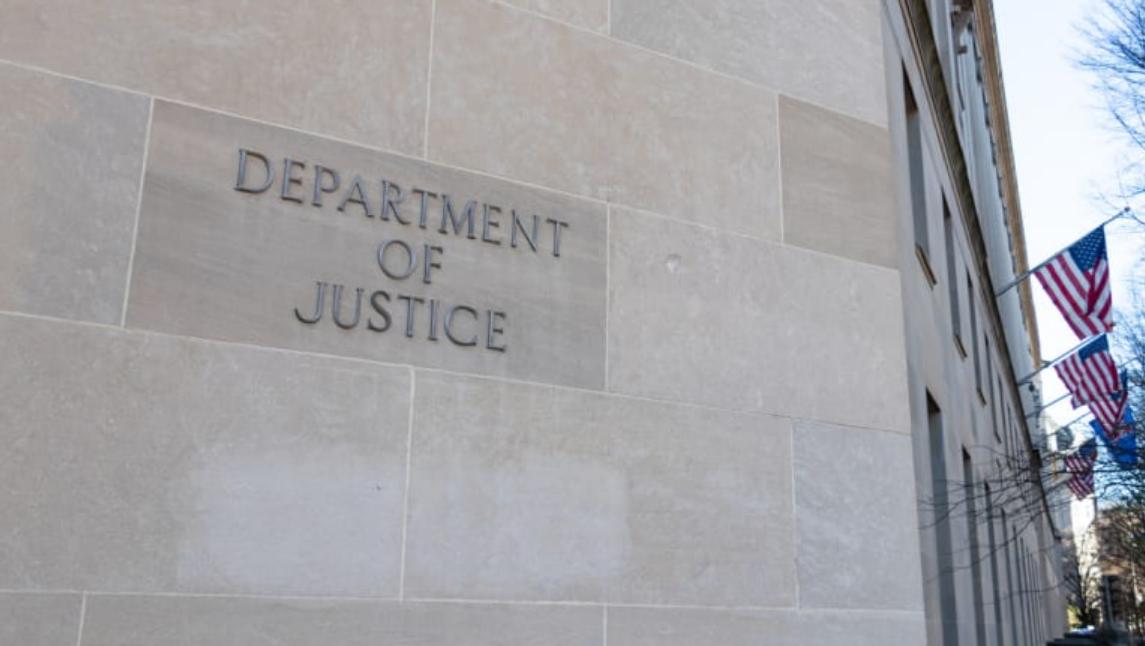
President Donald Trump is making good on his threat to punish California officials for allowing transgender female student-athletes to compete with cisgender girls in school sports.
On Wednesday, the U.S. Department of Justice announced it is suing the state’s Department of Education, claiming California’s policy to allow trans students to compete with other girls violates Title IX, the federal law that bans discrimination in education based on sex. The DOJ’s suit says California’s rules “are not only illegal and unfair but also demeaning, signaling to girls that their opportunities and achievements are secondary to accommodating boys.”
As the Washington Blade reported in June, this lawsuit follows a warning by the Trump administration to end the trans participation policy within 10 days or face referral to the DOJ as well as the loss of federal education funding.
And California may merely be the first to face legal action, according to U.S. Attorney General Pam Bondi, who warned that the 21 other states which permit trans girls to compete in female athletics could also face challenges by the federal government.
“If you do not comply, you’re next,” she said in a video posted on the DOJ website. “We will protect girls in girls sports.” Bondi was joined by Secretary of Education Linda McMahon.
The DOJ suit named California’s Education Department and the California Interscholastic Federation, the governing body for high school sports. A spokesperson for the CIF told the Associated Press the organization would not comment on pending litigation.
A spokesperson for Democratic Gov. Gavin Newsom deferred to the CIF and the Department of Education in declining to comment on the lawsuit since the governor was not named a defendant. But Newsom’s office told the AP that the Trump administration’s attacks on its policies protecting transgender athletes are “a cynical attempt” to distract from the federal government’s withholding of funds for all students who benefit from after-school and summer programs.
Newsom, however, has come under criticism — most notably by the Human Rights Campaign — for remarks he made in March, that allowing transgender athletes to compete in women’s sports was “deeply unfair,” as the Blade reported.
For more than a decade, California law has allowed students to participate in sex-segregated school programs, including on sports teams, and use bathrooms and other facilities that align with their gender identity.
But headlines about AB Hernandez, an out trans female high school student-athlete who won titles in the California track-and-field championships last month, drew condemnations from Assistant U.S. Attorney General Harmeet Dhillon, and President Trump himself.
Following the meet, Dhillon wrote in a letter to the California Interscholastic Federation that it violated the Equal Protection Clause of the Constitution by allowing trans girls to compete against other female athletes.
As for the lawsuit, DOJ claims California’s policies “ignore undeniable biological differences between boys and girls, in favor of an amorphous ’gender identity.’”
“The results of these illegal policies are stark: girls are displaced from podiums, denied awards, and miss out on critical visibility for college scholarships and recognition,” the suit says.
Last week, the U.S. Supreme Court agreed to hear two cases challenging state bans on trans student-athletes, as the Blade reported. More than 20 states have limited trans girls from participating on girls sports teams, barred gender-affirming surgeries for minors and required parents to be notified if a child changes their pronouns at school. More than two dozen states have laws barring trans women and girls from participating in certain sports competitions. Challenges to some of those policies are still being decided by courts across the country.
Back in February, the president signed an executive order that bans trans girls and women from participating in sports that match their gender identity, as the Blade reported.
Supporters of banning trans girls and women from competing include the conservative California Family Council, which has posted a petition online, arguing a ban would restore fairness in athletic competitions. Opponents like Equality California say bans are an attack on transgender youth.
“Local schools and athletic associations are the ones who should be handling these issues, and they are already creating policies that protect transgender youth and ensure a level playing field for all students. A federal ban that overrides those rules could require young girls to answer inappropriate personal questions or even be subjected to genital inspections by strangers if they want to participate in sports,” the organization said in a statement in February.
“The head of the NCAA, himself a former Republican Governor, recently told a U.S. Senate panel that he knew of less than 10 out transgender athletes among the 510,000 currently competing in college sports—less than .002 percent of all NCAA athletes.
“Studies confirm that participation in sports provides kids with invaluable life skills such as teamwork, leadership, discipline, and cooperation—fundamental lessons that every young person deserves the chance to experience. Beyond the field, sports also contribute significantly to students’ overall well-being, fostering better mental health, boosting academic performance, and enhancing self-esteem and confidence.”
California
Williams Institute reports impact of deportations on LGBTQ immigrants
Latest report suggests transgender, nonbinary and intersex immigrants face significantly higher safety risks
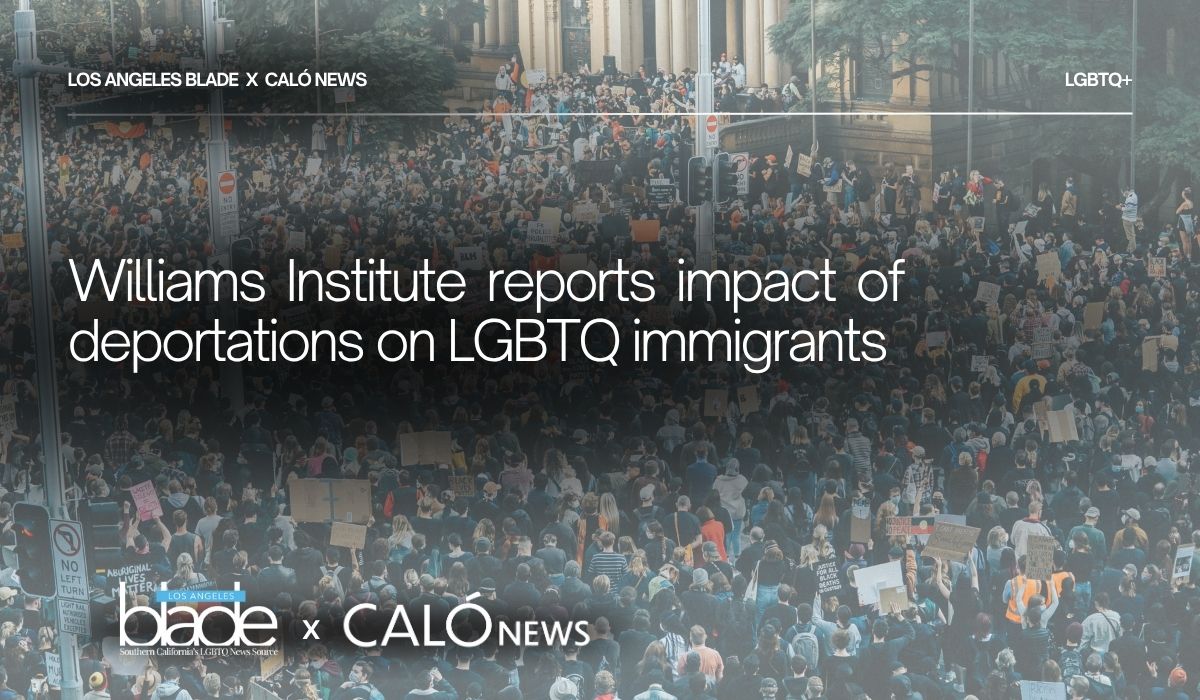
Williams Institute at UCLA has released its latest report, highlighting the intersection between LGBTQ and immigration issues and the impact of the U.S. Customs and Immigration Enforcement (ICE) raids across Los Angeles on LGBTQ people.
According to the brief, LGBTQ immigrants who hold legal status, but who are not naturalized citizens may also face challenges to their legal right to reside in the U.S.
Recent reports indicate that non-citizens with legal status are being swept up in immigration operations and several forms of legal status which were granted at the end of the Biden administration are being revoked. Those include: Temporary Protected Status (TPS) for some Venezuelan immigrants, as well as those from Afghanistan and Cameroon, while Haitian nationals are now facing shortened protection periods, by up to six months.
The Justice Department has proposed a new rule which grants the government border authority to revoke green card holders’ permanent residency status at any time. This rule is currently under review by the Third Circuit Court of Appeals, which could significantly affect non-citizens who are currently documented to reside in the county legally.
Supervisorial District 1, under Supervisor Hilda L. Solis, and Supervisorial District 2, under Supervisor Holly J. Mitchell would particularly be affected as it contains the city center of Los Angeles and nearly 29,000 LGBTQ, noncitizens would face the harshest impact. Those two districts contain many of the county’s historically Black, Latin American and Asian, Pacific Islander neighborhoods.
For transgender, nonbinary and intersex immigrants arrested or detained by ICE, there are additional impacts regarding how federal law defines biological sex and gender identity. The Trump administration has signed an executive order which redefines “sex” under federal law to exclude TGI individuals. This adds an extra thick layer of possible violence when TGI individuals are placed in detention centers or in holding that does not correspond to their identity.
According to the report, ‘transgender, non-binary, and intersex immigrants must navigate an
immigration and asylum system without information about how federal agents will respond to their gender identity and with the risk of greater violence if placed in detention centers, given the effects of this executive order.’
The brief estimates the number or foreign-born adults in Los Angeles County who will be potentially affected by the Trump administration’s executive orders on mass deportations.
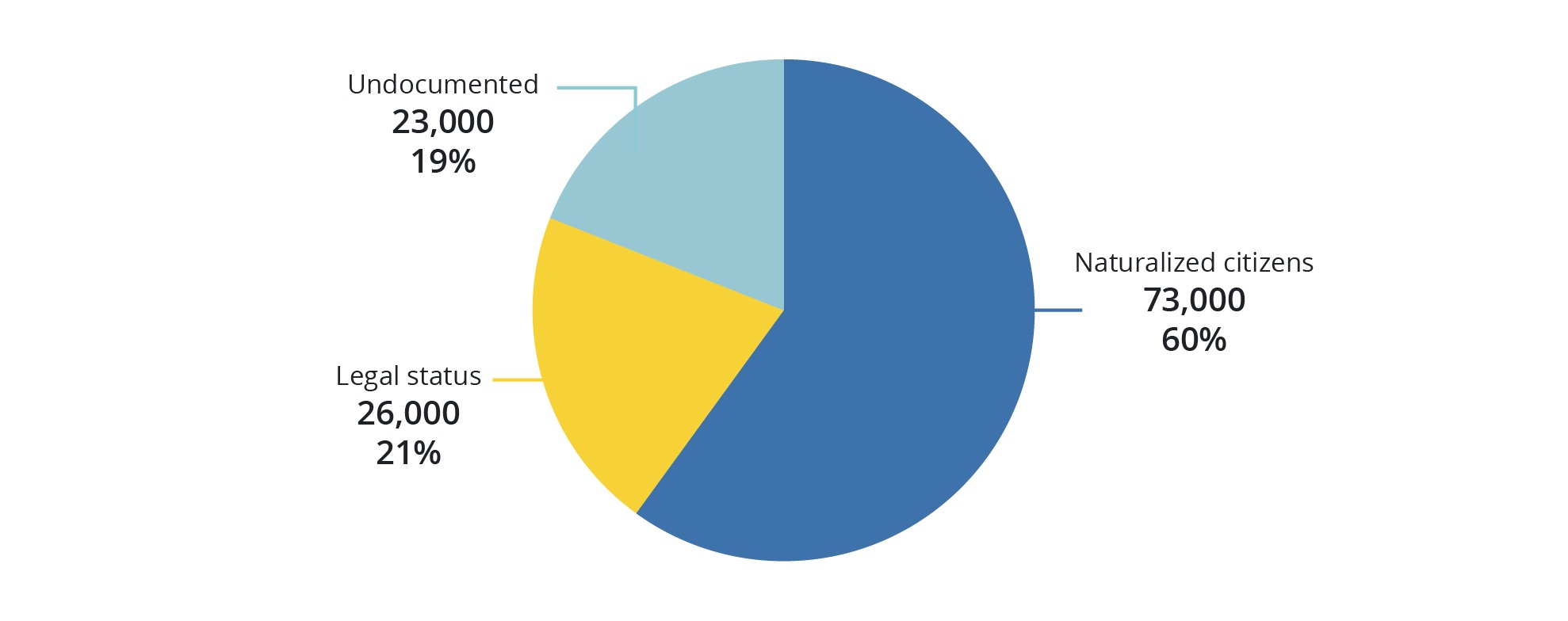
Graphic courtesy of Williams Institute at UCLA.
Using previous data from other Williams Institute Studies and reports from the University of Southern California Dornsife Equity Research Institute and data from the Pew Research Center, the latest brief states that there are over 1.35 million LGBTQ-identifying people across the U.S., with 30% of them residing in California.
The report further points to 122,000 LGBTQ immigrants who reside within LA County specifically, making Los Angeles County home to about 10% of all LGBTQ adult immigrants in the U.S.
While 18% of those Angelenos are foreign-born, only around 7%, or 49,000 of them do not hold legal status.
Using research from the Pew Center and applying an estimate, that means that there are approximately 23,000 undocumented LGBTQ across LA County and the remaining 26,000 LGBTQ immigrants in the county have some form of legal status.
Among the LGBTQ population of adult immigrants in California, approximately 41,000 are transgender or nonbinary. That figure also points toward approximately 5,200 of them residing in LA County. According to the proportions applied for this estimate, the Williams Institute approximates that around 3,100 transgender and nonbinary immigrants in LA County are naturalized citizens, over 1,100 have legal status and just under 1,000 are undocumented.
According to a brief released in February by the Williams Institute, ‘mass deportations could impact 288,000 LGBTQ undocumented immigrants across the U.S.
-
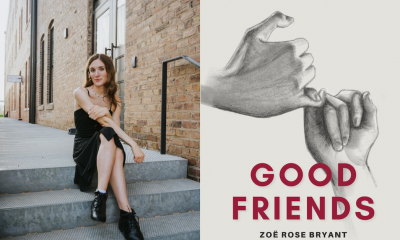
 Books19 hours ago
Books19 hours agoZoë Rose Bryant on her chart-topping debut novel ‘Good Friends’ and inspiring young trans people online
-
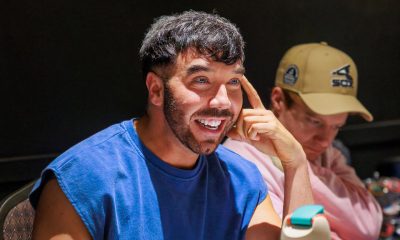
 a&e features5 days ago
a&e features5 days agoFrom ‘So Random’ to sexy theater: LA’s very own Mathew Scott Montgomery
-
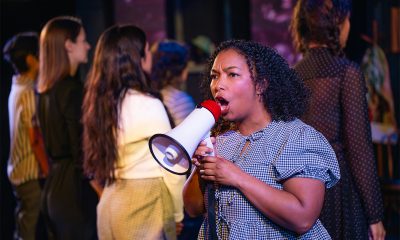
 Reviews3 days ago
Reviews3 days ago“The June Jordan Experience” captures the late queer poet’s tender, revolutionary legacy
-

 Los Angeles20 hours ago
Los Angeles20 hours agoNikko LaMere’s photo exhibit “JOY!” documents the euphoria of Black queer nightlife
-
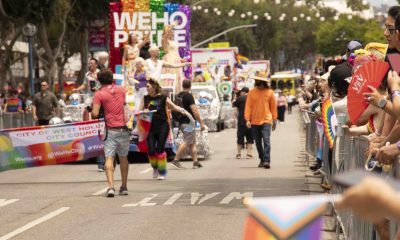
 Viewpoint23 hours ago
Viewpoint23 hours agoGay acceptance in US takes a dangerous reversal
-

 Commentary2 days ago
Commentary2 days agoValentine’s Day, Alone
-

 National16 hours ago
National16 hours agoLGBTQ+ activists mourn the Rev. Jesse Jackson
-

 Commentary13 hours ago
Commentary13 hours agoPost-Valentine’s Day: Are your standards protecting you — or keeping you single?

